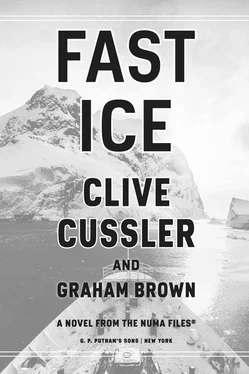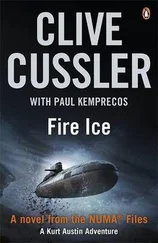“There was a wreck on the Potomac,” Kurt joked.
“On the Potomac?” Rudi said. “You mean the Beltway, don’t you?”
“I mean the river,” Kurt said. “We were out on the ice, testing a new sail that Joe designed for my ice yacht. Unfortunately, it worked a little too well. The rest of the machine couldn’t handle the speed.”
Joe disagreed. “More like pilot error.”
“Or faulty construction,” Kurt shot back.
Rudi smiled. He was used to Kurt and Joe building machines and wrecking them. Usually they were expensive prototypes accounted for in the NUMA development budget.
“I have no idea what an ice yacht is,” Rudi said. “But at least I didn’t have to pay for it. More importantly, you two don’t seem to mind the cold. That’ll come in handy where you’re going.”
Kurt unzipped his jacket and took a seat. “Sounds rather ominous.”
“My thoughts exactly,” Joe said. He made his way over to the coffee machine, searching unsuccessfully for the treasured cinnamon hot chocolate. “And what, exactly, are we in for?”
“Let me explain,” Rudi said. He dimmed the lights and used a remote to turn on a large flat-screen. “Early this morning, one of our satellites made a pass over southern waters between South Africa and the Antarctic coast. It was a standard high-resolution, wide-scan run. The main purpose of the sweep was to study the melting of sea ice and the extent to which recently calved icebergs have moved. As you might imagine, we picked up plenty of icebergs. And then something else entirely.”
Rudi clicked the remote. A wide shot appeared on the screen. It showed a large expanse of dark water speckled with flakes of white. Digital lettering in the corner revealed the time and date of the image, along with the latitude and longitude.
“I do believe you’ve found the Great Southern Ocean,” Kurt said.
“Nothing gets past you,” Rudi said. He clicked the remote again, zooming in on one speck of white in one part of the image.
At first glance, it appeared to be a small iceberg. But as Rudi continued to zoom in, the image took on the form of a ship. Closer still and the three-dimensional structure of the vessel could be seen. It had a wide bow and a tall superstructure. Every inch seemed to be covered in a thick layer of white frost, except for a square section on the top of the accommodations block and the helicopter tied down to the landing pad at the stern.
“Frozen solid,” Kurt noted.
“Appears to be listing, too,” Joe said.
“Doesn’t look like a whaler or a fishing trawler,” Kurt said. “Not with that helicopter on the stern. It’s obviously not military. Must be a research ship.”
“It is,” Rudi said. “We’ve identified it as a scientific vessel out of Cape Town. Its most recent name is Grishka , though the ship is forty years old and on its fifth name and seventh owner.”
“Have you alerted the South African Navy?”
“Not yet,” Rudi replied.
Kurt raised an eyebrow. “That would seem like the prudent thing to do.”
“Under normal circumstances, yes,” Rudi said. “But in this particular case, I want you and Joe to go investigate first.”
“And by ‘investigate,’” Kurt clarified, “you mean fly out there, climb aboard the ship and find out why it got caught in the frozen food section of the ocean?”
Rudi nodded.
Joe raised a finger to interject. “You realize that ship is about as far from Washington as it’s possible to get while still remaining on the planet Earth?”
Rudi nodded. “Yes, Mr. Zavala. I do have a globe of my own.”
“So why send us?” Kurt asked.
“Because Cora Emmerson was on that ship.”
Once the name dropped, silence followed. Cora was a former member of NUMA and a brilliant scientist. She’d been with the organization for three years when Rudi brought her to Washington. She’d been especially close to both Kurt and Rudi, before striking out on her own. She’d also been a lot of trouble.
“Are you certain of this?”
“Not entirely,” Rudi admitted, “but we know she was aboard at one point. An expedition she cobbled together chartered that ship out of Cape Town. They left four months ago. We have no track on where they went or where the ship has been since. According to the harbormaster’s records, it hasn’t been back to South Africa.”
Kurt glanced back at the frozen ship on the screen.
“Sorry to interrupt,” Joe said. “But you two are leaving me in the dark. Who, exactly, is Cora Emmerson?”
Rudi explained. “Cora was a climate expert who worked for NUMA. She’d come to us from a doctoral program at UCLA after several years working internationally. She excelled on her initial field assignments and was hungry to do more. I brought her to D.C., where I thought she would shine, but she decided government work was stifling her ability to bring about radical change in the world’s climate policy. So, she resigned.”
“Twice, if I’m not mistaken,” Kurt said, “since you shredded her first letter.”
Rudi was unapologetic. “We wanted to keep her. That’s what you do with good people.” He turned back to Joe. “Everyone tried to convince her to stay. Everyone except for Kurt.”
Kurt had no desire to open up this disagreement once more. He and Rudi were usually on the same page, but Cora’s abrupt resignation had been a rare point of conflict between them three years ago.
The truth was he’d given Cora the advice he thought was best for her. “She needed freedom,” Kurt said. “The kind she wasn’t going to get working for a big government agency in the D.C. spotlight. I told her it was okay to reach for what she wanted. Ultimately, she made her own decision. Like all of us do.”
Rudi nodded. “Unfortunately, that decision may have brought her to a cold and bitter end.”
Kurt glanced at the screen again. The ship was frozen, adrift and dark. It looked dead. Obviously, Rudi figured everyone on board for a similar condition. “All right,” Kurt said. “What gives here?”
Rudi narrowed his gaze. “What do you mean?”
“I mean,” Kurt said, “there’s zero chance you just happened to spot a frozen ship half the size of the smallest iceberg in the region with a standard weather satellite. You couldn’t have found that ship unless you were looking for it. More to the point, how could you know Cora was even on board?”
Rudi’s intense demeanor softened just a bit. “Because I got a message from her nine weeks ago. She said she was out on the ice shelf and that she and her team had found something incredible. Something with the power to remake the world.”
“Remake the world?” Joe said. “That’s a strong claim.”
“There might be some exaggeration to it,” Rudi explained. “You have to understand Cora. If she didn’t save the planet by the time she was forty, she was going to be disappointed.”
Rudi was right about that. “Did this message say anything else?” Kurt asked.
“No details about what she’d found,” Rudi said. “She promised she’d share them with us once she got back from Antarctica. Her bigger concern was making it back. She insisted there were people who didn’t want this discovery to see the light of day. In her words, ‘powerful, well-financed people.’ She didn’t know who they were but claimed her team had dealt with sabotage in the run-up to leaving South Africa and had been under surveillance at times while they were out on the ice.”
“Under surveillance?”
“She said they’d picked up high-frequency radio signals that weren’t coming from the camp. And on several occasions they’d seen drones in the distance. While I can’t confirm any of that, I think we can all agree there’s not a lot of drone traffic in remote areas of Antarctica.”
Читать дальше












